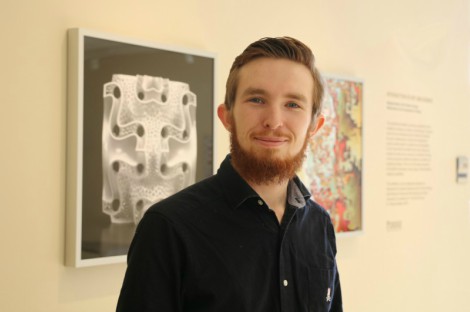CRA Honors Two Computer Science Students for Excellence in Undergraduate Research
01-29-2018
Writer(s): Kristyn Childres
Raphael Meyer and Clayton Thomas were recognized in the 2018 CRA Outstanding Undergraduate Research Awards, which honor undergraduate students in North American universities who show outstanding research potential in an area of computing research. The program selected four awardees, four runners-up, 14 finalists and 47 honorable mentions.

CS junior Raphael Meyer was recognized as a finalist for his research in secure computation, completed under the direction of Hemanta K. Maji, assistant professor of computer science. Secure multi-party computation, a gem of modern cryptography, allows distrusting parties to mutually compute while maintaining the privacy of their respective data. However, even in the semi-honest two-party setting (where parties follow the protocol honestly but are curious to find additional information about the other party’s input), most interesting computations cannot be performed securely. Maji and Meyer’s research, completed with undergraduate student Amisha Jhanji, studies the interplay between accuracy and privacy, ultimately providing an optimal accuracy-versus-privacy tradeoff.
“Our work lays the foundation for a new technique to tightly characterize the maximum achievable security for various computations. Raphael proposed the idea of appropriately relaxing the original goal while preserving close approximations to the optimally secure protocols. In this relaxed setting, we can quickly determine these approximations, thus revealing the maximum achievable security,” said Maji.
Meyer said, “I love computer science because it is one of very few unique fields with the amazing property that everything in the field was built from the ground up, by people. That has a fascinating implication – if I don’t understand something, I can ask questions until it’s completely explained. That’s why I’m never afraid to ask questions in lecture: in computer science, there’s an answer for any question you might have.”
“Purdue is an exciting place to be right now,” said Meyer, who chose Purdue in part because his father is a CS alum. “The department is growing, and so many new faculty members are excited to establish their research programs, often going out of their way to offer courses about their unique research. I have found so many opportunities to learn new and interesting things from passionate people.”
 Clayton Thomas (B.S. ’17) received an honorable mention for his research in erasure coding schemes for distributed storage, completed under the direction of Assistant Professor Elena Grigorescu. Modern distributed storage systems face the challenge of having to provide data protection in complex settings, where data is stored across different locations or storage media. Such systems aim to employ erasure coding schemes that have low redundancy overheads and good failure recovery capabilities. Maximally recoverable codes – codes that are able to correct all correctable erasure patterns – have promising capabilities that have generated recent interest both in theory, as well as in applications. However, ensuring maximal recoverability hampers coding efficiency.
Clayton Thomas (B.S. ’17) received an honorable mention for his research in erasure coding schemes for distributed storage, completed under the direction of Assistant Professor Elena Grigorescu. Modern distributed storage systems face the challenge of having to provide data protection in complex settings, where data is stored across different locations or storage media. Such systems aim to employ erasure coding schemes that have low redundancy overheads and good failure recovery capabilities. Maximally recoverable codes – codes that are able to correct all correctable erasure patterns – have promising capabilities that have generated recent interest both in theory, as well as in applications. However, ensuring maximal recoverability hampers coding efficiency.
Their work, completed with Venkata Gandikota (Ph.D. ’17) and current graduate student Minshen Zhu, initiates the study of a variant of maximal recoverability, where instead of correcting everything, one is only required to correct all erasure patterns of small size. Grigorescu said, “Clay came up with an ingenious construction of an erasure-coding scheme. The level of sophistication of his proof is what I would expect from an advanced graduate student.”
Thomas graduated in December and will attend graduate school in the fall. When asked about his enthusiasm for research, Thomas said, “Last summer, a coworker at my internship said, ‘I like projects in industry better than school projects, because they’re bigger and more impactful and they actually do things.’ That struck me as fundamentally wrong. It doesn’t fit with my personal worldview at all. Although industry projects might involve a bigger block of code, build on bigger libraries, or do bigger things, they don’t progress knowledge in any direction. Research projects are big in an entirely different way. They build on each other – on the sum total of human knowledge. Research means extending the field, as opposed to applying it.”
Chosen primarily based on excellent research, the award also requires nominees to have engaged in some form of service, such as club leadership. Thomas is an avid rock climber and gymnast, with involvement in Purdue’s Outing Club, gymnastics team and Rec Center climbing wall. He said, “Rock climbing has taught me a lot about independence. In high school, I wouldn’t have described myself as an independent person – academically or otherwise. But when I came to college, I learned about sports like rock climbing, where you just go off on your own, with some friends. That mindset has proven useful in academia, too – gradually, I began doing things independently of my courses. It was during my project with Dr. Grigorescu, Venkata and Minshen that I made my first completely independent research discovery. That moment makes me very happy to think about.”